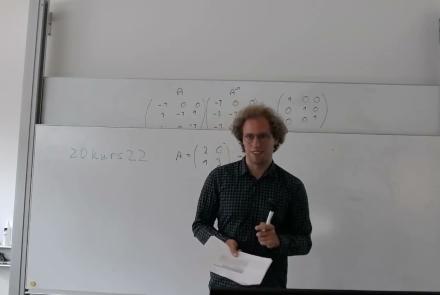Course:
The Mouse Phenome Database (MPD) provides access to primary experimental trait data, genotypic variation, protocols and analysis tools for mouse genetic studies. Data are contributed by investigators worldwide and represent a broad scope of phenotyping endpoints and disease-related traits in naïve mice and those exposed to drugs, environmental agents or other treatments. MPD ensures rigorous curation of phenotype data and supporting documentation using relevant ontologies and controlled vocabularies. As a repository of curated and integrated data, MPD provides a means to access/re-use baseline data, as well as allows users to identify sensitized backgrounds for making new mouse models with genome editing technologies, analyze trait co-inheritance, benchmark assays in their own laboratories, and many other research applications. MPD’s primary source of funding is NIDA. For this reason, a majority of MPD data is neuro- and behavior-related.
Difficulty level: Beginner
Duration: 55:36
Speaker: : Elissa Chesler
Introduction of the Foundations of Machine Learning in Python course - Day 01.
High-Performance Computing and Analytics Lab, University of Bonn
Difficulty level: Beginner
Duration: 35:24
Speaker: : Elena Trunz
Optimization for machine learning - Day 02 lecture of the Foundations of Machine Learning in Python course.
High-Performance Computing and Analytics Lab, University of Bonn
Difficulty level: Advanced
Duration: 34:52
Speaker: : Moritz Wolter
Linear Algebra for Machine Learning - Day 03 lecture of the Foundations of Machine Learning in Python course.
High-Performance Computing and Analytics Lab, University of Bonn
Difficulty level: Advanced
Duration: 57.45
Speaker: : Moritz Wolter
Support Vector Machines - Day 06 lecture of the Foundations of Machine Learning in Python course.
High-Performance Computing and Analytics Lab, University of Bonn
Difficulty level: Advanced
Duration: 53.39
Speaker: : Elena Trunz
Decision Trees and Random Forests - Day 07 lecture of the Foundations of Machine Learning in Python course.
High-Performance Computing and Analytics Lab, University of Bonn
Difficulty level: Advanced
Duration: 1:15:39
Speaker: : Elena Trunz
Clustering and Density Estimation - Day 08 lecture of the Foundations of Machine Learning in Python course.
High-Performance Computing and Analytics Lab, University of Bonn
Difficulty level: Advanced
Duration: 59:35
Speaker: : Elena Trunz
Dimensionality Reduction - Day 09 lecture of the Foundations of Machine Learning in Python course.
High-Performance Computing and Analytics Lab, University of Bonn
Difficulty level: Advanced
Duration: 51:02
Speaker: : Elena Trunz
Introduction to Neural Networks - Day 10 lecture of the Foundations of Machine Learning in Python course.
High-Performance Computing and Analytics Lab, University of Bonn
Difficulty level: Advanced
Duration: 54:12
Speaker: : Moritz Wolter
Introduction to Convolutional Neural Networks - Day 11 lecture of the Foundations of Machine Learning in Python course.
High-Performance Computing and Analytics Lab, University of Bonn
Difficulty level: Advanced
Duration: 42:07
Speaker: : Moritz Wolter
Initialization, Optimization, and Regularization - Day 12 lecture of the Foundations of Machine Learning in Python course.
High-Performance Computing and Analytics Lab, University of Bonn
Difficulty level: Advanced
Duration: 42:07
Speaker: : Moritz Wolter
U-Nets for medical Image-Segmentation - Day 13 lecture of the Foundations of Machine Learning in Python course.
High-Performance Computing and Analytics Lab, University of Bonn
Difficulty level: Advanced
Duration: 16:45
Speaker: : Moritz Wolter
Sequence Processing - Day 15 lecture of the Foundations of Machine Learning in Python course.
High-Performance Computing and Analytics Lab, University of Bonn
Difficulty level: Advanced
Duration: 47:45
Speaker: : Moritz Wolter
Course:
This lesson provides an introduction to biologically detailed computational modelling of neural dynamics, including neuron membrane potential simulation and F-I curves.
Difficulty level: Intermediate
Duration: 8:21
Speaker: : Mike X. Cohen
Course:
In this lesson, users learn how to use MATLAB to build an adaptive exponential integrate and fire (AdEx) neuron model.
Difficulty level: Intermediate
Duration: 22:01
Speaker: : Mike X. Cohen
Course:
In this lesson, users learn about the practical differences between MATLAB scripts and functions, as well as how to embed their neuronal simulation into a callable function.
Difficulty level: Intermediate
Duration: 11:20
Speaker: : Mike X. Cohen
Course:
This lesson teaches users how to generate a frequency-current (F-I) curve, which describes the function that relates the net synaptic current (I) flowing into a neuron to its firing rate (F).
Difficulty level: Intermediate
Duration: 20:39
Speaker: : Mike X. Cohen
This lecture covers a lot of post-war developments in the science of the mind, focusing first on the cognitive revolution, and concluding with living machines.
Difficulty level: Beginner
Duration: 2:24:35
Speaker: : Paul F.M.J. Verschure
This lesson delves into the the structure of one of the brain's most elemental computational units, the neuron, and how said structure influences computational neural network models.
Difficulty level: Intermediate
Duration: 6:33
Speaker: : Marcus Ghosh
In this lesson you will learn how machine learners and neuroscientists construct abstract computational models based on various neurophysiological signalling properties.
Difficulty level: Intermediate
Duration: 10:52
Speaker: : Dan Goodman
Topics
- Artificial Intelligence (5)
- Philosophy of Science (5)
- Notebooks (2)
- Provenance (2)
- protein-protein interactions (1)
- Extracellular signaling (1)
- Animal models (3)
- Assembly 2021 (27)
- Brain-hardware interfaces (13)
- Clinical neuroscience (12)
- International Brain Initiative (2)
- Repositories and science gateways (5)
- Resources (6)
- General neuroscience
(25)
- Neuroscience (1)
- Cognitive Science (7)
- Cell signaling (4)
- Brain networks (8)
- Glia (1)
- (-) Electrophysiology (13)
- Learning and memory (4)
- Neuroanatomy (9)
- Neurobiology (13)
- Neurodegeneration (1)
- Neuroimmunology (1)
- Neural networks (13)
- Neurophysiology (4)
- Neuropharmacology (1)
- Neuronal plasticity (16)
- Synaptic plasticity (1)
- Visual system (1)
- Phenome (1)
- (-)
General neuroinformatics
(12)
- (-) Computational neuroscience (120)
- Statistics (7)
- Computer Science (7)
- (-) Genomics (32)
- Data science
(19)
- Open science (27)
- Project management (3)
- Education (2)
- Neuroethics (7)


















